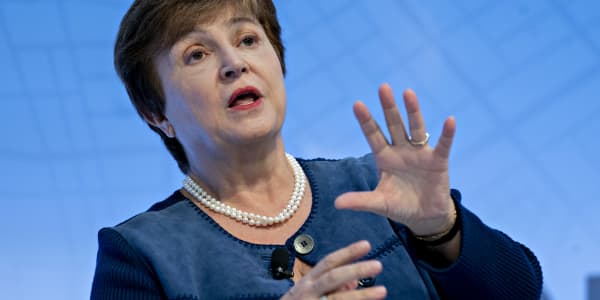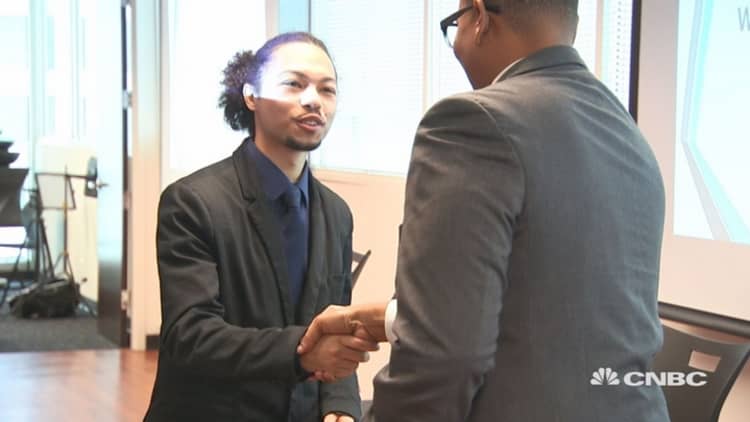
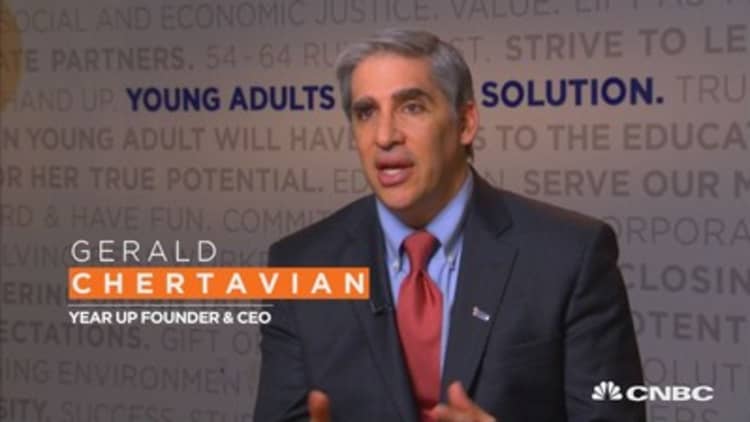
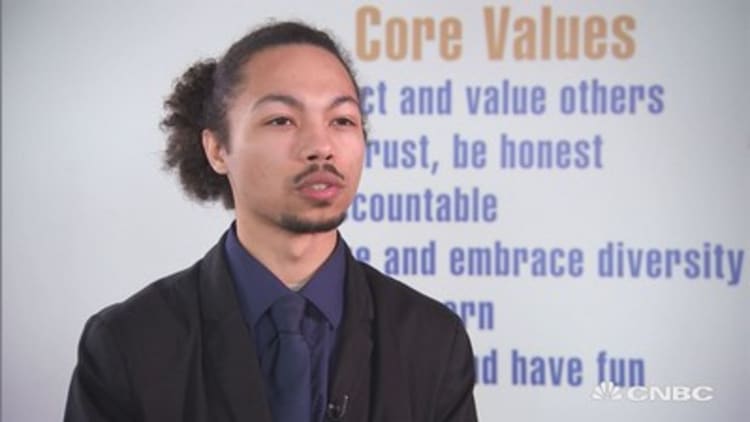
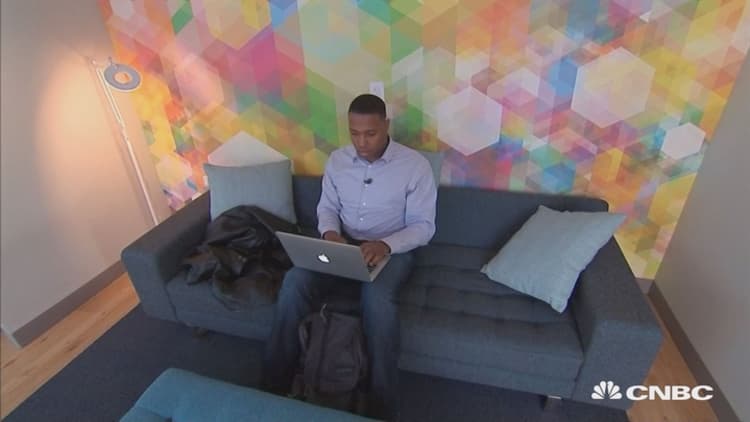
Six years ago, Brandon Jordan was a high school dropout, living on the streets of Atlanta.
"There were times where I didn't know what I was going to eat, there were times where I didn't know where I was going to sleep, just not knowing if you're going to survive the next day," said Jordan, now 24 years old.
At 18, he was homeless, but not hopeless.
"I ended up realizing that I need to do what I need to do," he said. He got his GED, "and from there on I pretty much said I'm going to climb and do nothing but strive for the best."
Jordan got an apartment with friends and tried college, but ran out of money.
"I wanted more for myself but I didn't quite have the opportunity or anything going for myself to get where I wanted to be."
He was working at Panera when he saw an ad on a train that changed his life.
Jordan applied to Year Up, a nonprofit that offers low-income urban youths six months of intensive training and a six-month corporate internship in IT, financial operations, project management, quality assurance or customer service. Not only is it free, students get a stipend and college credit.
If someone told me three years ago that I'd be doing what I'm doing today, I wouldn't believe it. I might even have laughed.Bryan GoodsonYear Up graduate
Gerald Chertavian, who worked on Wall Street before attending Harvard Business School and co-founding a software company, started the program in 2000. But he'd been planning it for more than a decade. He was inspired when he participated in the Big Brother program.
"I was matched with a young boy in New York City who lived in what was then the most heavily photographed crime scene in New York City," Chertavian said. "He was someone I spent all of my Saturdays with and he really taught me about the opportunity divide."
There are currently 6.7 million 16- to 24-year-olds in the U.S. who are neither enrolled in school nor participating in the labor market, according to United We Serve, President Barack Obama's nationwide service initiative. This group is disproportionately male and from minority groups. Thirty-two percent are black, although that group makes up only 15 percent of that age segment.
Year Up is aimed at these so-called opportunity youth, and is founded on the thesis that "talent is distributed evenly across this country yet opportunity is not," as Chertavian put it.
"There are a significant number of young people who need opportunities to increase their education levels, gain access to the labor market," said Valerie Wilson, director of the program on race, ethnicity and the economy at the Economic Policy Institute. "They're important to the economy, to this country. Demographics are changing, people of color are making up a larger share of the population and labor force. We cannot afford to ignore or overlook this part of the population."
Year Up applicants must be 18-24 years old and have a high school diploma or GED. Many have some college credit but often were forced to drop out for financial reasons. Almost all have faced some type of adversity, including homelessness, foster care, drug abuse and teen pregnancy. And all want something more for themselves, they just haven't found the path to achieve it.
Year Up offers that path. But most prospective participants are skeptical at first. Graduate Bryan Goodson passed up his first opportunity to apply. "I thought it was too good to be true," he said. It's a sentiment Chertavian said he hears echoed again and again.
But so many young people do apply, only 1 in 5 applicants makes the cut. The admissions committee looks for motivation above anything else.
If getting in is tough, the program itself is tougher. Students sign a contract that lays out the expectations and consequences for not meeting those expectations. If you're one second late to class, you're docked money and points (which is why all the clocks at Year Up are digital). You can also be penalized for bad language, missing assignments or not dressing professionally, among other things. If you lose too many points, you're out of the program. Twenty-five percent of those who start, don't finish.
Students learn the technical skills they'll need for their internship, but they also spend a lot of time learning soft skills. In addition to being on time and dressing for success, they practice such things as how to shake hands and make eye contact, writing a professional email and perfecting an elevator pitch.
"Year Up fundamentally believes that you hire for skills but you fire for behavior," said Chertavian. "If you talk to many, many companies across the country today, they're not getting the professional skills and the customer service skills, and really the teamwork, reliability, problem solving, they're not getting those skills from many young adults coming out of even four-year college settings."
Those who make it through the six-month classroom boot camp are awarded an internship at one of 250 companies that partner with Year Up, including Facebook, Google, Twitter, JPMorgan Chase, American Express, Macy's, Novartis, Biogen, AT&T and CNBC's parent company, Comcast.
Year Up fundamentally believes that you hire for skills but you fire for behavior.Gerald ChertavianYear Up founder
The companies pay Year Up $27,700 per intern, which covers the student's stipend and college credits and administrative costs of running Year Up. Some companies have scaled up to take 100 interns a year, paying more than $250,000 for what they have come to consider a pipeline instead of a charity. The organization's operating budget this year is $100 million.
Salesforce.com, based in San Francisco, has hosted almost 200 interns in 15 classes since 2009.
"The Year Up kids come in ready to work," said Suzanne DiBianca, president of Salesforce.org and the manager of Salesforce's partnership with Year Up. "They know what to wear, they know what to say, they have done their homework properly, they are gregarious in meeting other people, doing their research on other executives in that department. They are, I would say, a head above a lot of other intern programs in terms of readiness to work."
Salesforce has hired 57 percent of its Year Up interns.
That includes Goodson, who graduated from Year Up in 2013. Before enrolling in the program at age 21, he was working at a pizza concession at a Six Flags amusement park. Now, he's a full-time business solutions senior consultant.
"If someone told me three years ago that I'd be doing what I'm doing today, I wouldn't believe it. I might even have laughed," Goodson said. "I'm proud to tell people about my job, I'm proud to tell people about Year Up and what I've gone through to get here, and really my hope is to be an inspiration to other people in that regard."
Goodson's achievements are far from unique. In fact, Year Up's success rate is astounding. More than 13,000 young adults have gone through Year Up. Within four months of graduating, 85 percent of alumni have a full-time job or are enrolled full time in college. Their average starting salary is $36,000 a year, more than double the minimum wage. Many of them are still at the company at which they interned.
Wilson says organizations like Year Up "are useful, because there's only so far we can go with macro-economic policies. They bring things down to a level where we can begin to look at individuals who have barriers," who don't have the opportunities to go to college, get an internship and create a network that can help them get a job, because of who is in their own sphere.

Year Up has gone from its first class of 22 students in Boston in 2002 to expectations of serving 3,200 students in 2016. It's in 13 metro areas, with plans to add Dallas and Los Angeles this year. Eventually, Chertavian wants to be in 30 metro areas, and have 100,000 students go through the program. His original goal was 10,000.
"I guess it showed me that you should always think big, go to sleep, get up in the morning, and think even bigger, especially when you're trying to tackle such a tremendous opportunity that's resonant within our young adults in this country that's right now not being realized," he said.
The Year Up experience doesn't end when a student finishes his or her internship. There is an extensive alumni network. Goodson sits on the alumni board, in addition to mentoring new Year Up interns at Salesforce. And many present students already talk about giving back.
When Brandon Jordan looks ahead, he wants "to make sure that I'm giving back to the Year Up program because they've done so much for me. I want to make sure that the young adults, five years from now are getting just as good as an experience as I have, and any help that I can, I will reach out to them."
Jordan finished the six months of classroom training in Atlanta at the end of January, and has just started a six-month IT internship doing programming at Aaron's, a lease-to-own furniture and electronics retailer.
"When they called my name I actually didn't realize it for a second, I was looking around and I was like, 'Oh that's me,'" he said. "I got up I was like, 'Yeah you know, I did it, I earned this, this is, I'm gonna do this, this is mine, this is mine.'"
DISCLOSURE: One of the partner companies of Year Up is Comcast, the parent company of CNBC.
Watch CNBC's "Power Lunch" each day this week to see the work being done to bridge America's divide.












